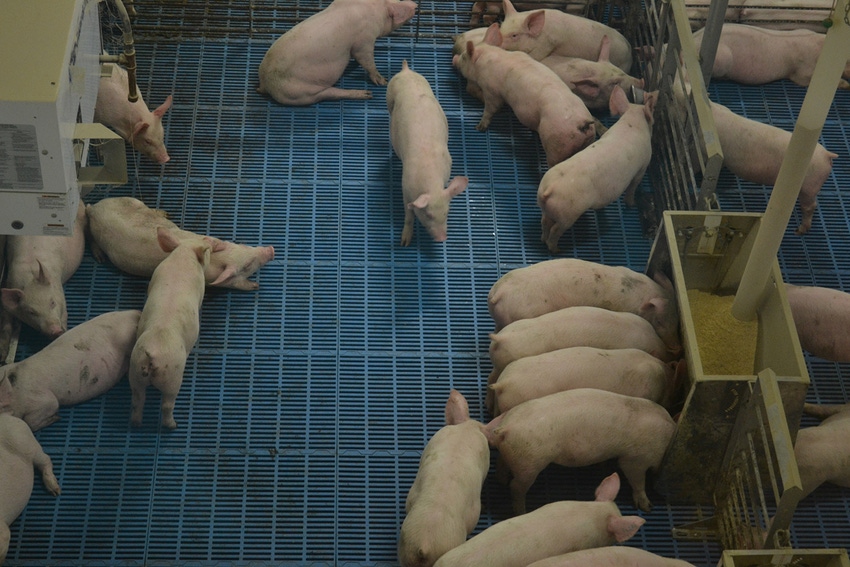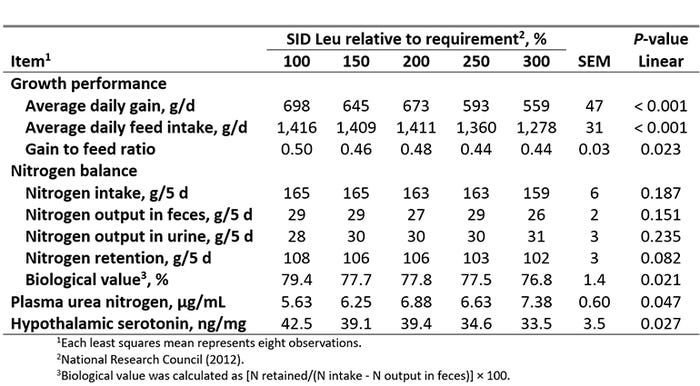UPDATED: Excess dietary leucine reduced the average daily gain, average daily feed intake and gain-to-feed ratio in growing pigs.
May 30, 2019

By Woong B. Kwon and Hans H. Stein, University of Illinois
Valine and isoleucine are considered to be the next limiting amino acid after lysine, threonine, methionine and tryptophan in corn-soybean meal-based diets for pigs whereas leucine is usually in excess because of its high concentration in corn protein. Together with leucine, valine and isoleucine are the three branched chained amino acids. In general, corn and corn co-products and sorghum and sorghum co-products have high leucine concentrations compared with other ingredients. Therefore, it is more likely that diets have excess leucine if large amounts of corn or sorghum co-products are used. As an example, if diets contain distillers dried grains with solubles, corn germ meal or other high-protein corn co-products, the concentration of dietary leucine will be well above the requirement for this amino acid.
However, results of previous research have indicated that excess dietary leucine may reduce pig feed intake and growth performance. Therefore, an experiment was conducted to test the hypothesis that excess dietary leucine may affect nitrogen balance and growth performance in growing pigs.
Five experimental diets were based on identical quantities of corn, soybean meal, wheat and barley and formulated to contain 100, 150, 200, 250 or 300% of the requirement for standardized ileal digestible leucine by adding increasing concentrations of crystalline leucine to the diets. Forty barrows (initial body weight: 30.0 ± 2.7 kilograms) were housed individually in metabolism crates and allotted to five dietary treatments (eight replicates per treatment).
The body weight of pigs was recorded at the start and at the end of the experiment, and daily feed provisions were recorded to evaluate growth performance of pigs. Feces and urine were quantitatively collected to measure nitrogen balance and biological value of the diets. At the end of the experiment, blood and tissue samples were collected to analyze plasma urea nitrogen and hypothalamic serotonin.
Excess dietary leucine reduced the average daily gain, average daily feed intake and gain-to-feed ratio in growing pigs (Table 1). Reduced growth performance is most likely due to reduced feed intake by excess dietary leucine because excess dietary leucine may generate imbalanced supply of branched chained amino acids for protein synthesis that resulted from degradation of branched chained amino acids. Increased plasma urea nitrogen as dietary leucine increased may be a result of the reduced availability of valine and isoleucine and further indicates that excess leucine creates an amino acid imbalance.

In addition, decreased nitrogen retention and biological value of protein in diets as dietary leucine increased is indicative of the reduced utilization of dietary nitrogen for protein deposition. Pigs can detect branched chained amino acid imbalances in a diet and they will avoid eating that diet, which indicates that there is an innate mechanism against imbalanced supply of indispensable amino acids in the diet.
Excess dietary leucine reduced serotonin concentration in hypothalamus. Serotonin is important for appetite regulation and is synthesized from tryptophan in the brain, and excess dietary leucine may hinder uptake of tryptophan in the brain. Thus, the decreased serotonin concentration in hypothalamus that was observed as dietary leucine increased, indicates that excess dietary leucine may reduce tryptophan uptake into the brain, resulting in decreased serotonin synthesis in the hypothalamus. This may have contributed to the reduced feed intake observed for pigs fed diets with excess leucine.
In summary, these results indicate that excess dietary leucine has a negative impact on growth performance, protein retention and synthesis, and serotonin synthesis in growing pigs. Further research is needed to investigate strategies to overcome the negative impact of excess leucine in diets for growing pigs.
Sources: Woong B. Kwon and Hans H. Stein, who are solely responsible for the information provided, and wholly owns the information. Informa Business Media and all its subsidiaries are not responsible for any of the content contained in this information asset.
You May Also Like



